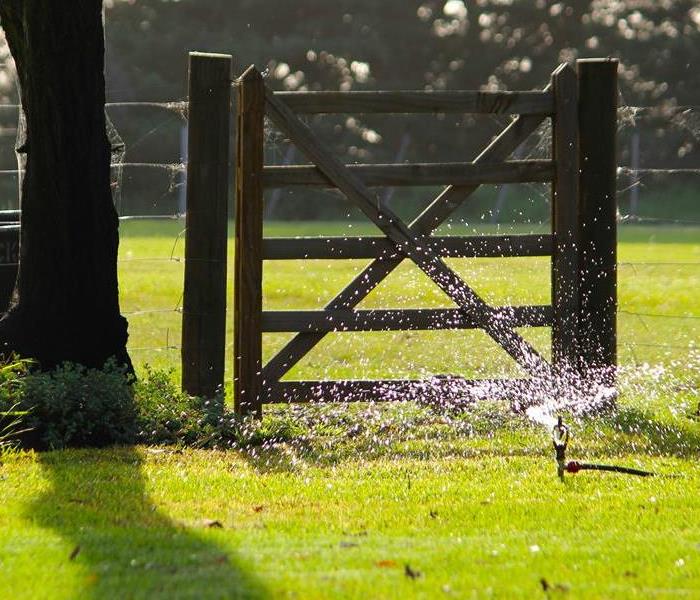Unveiling The Hidden Dangers: How Irrigation Systems Can Lead To Water Damage
8/7/2024 (Permalink)
In landscaping and agriculture, irrigation systems are hailed as modern marvels, revolutionizing how we nourish our crops and maintain lush green lawns. However, a hidden danger lurks the potential for water damage amidst their convenience and efficiency.
While these systems are designed to deliver water precisely where needed, they can also wreak havoc if not properly installed, maintained, or monitored. Let's delve into the depths of this issue, uncover the often-overlooked risks associated with irrigation systems, and help you protect your Norwalk property.
What Are Some Overlooked Risks Associated With Irrigation Systems?
Here are some ways that your irrigation system could cause problems at your Norwalk home or business:
- Leakage Woes: One of the most common culprits of water damage in irrigation systems is leakage. Whether due to poor installation, aging infrastructure, or simple wear and tear, leaks can go undetected for extended periods, silently saturating soil, eroding foundations, and compromising the structural integrity of buildings. Underground leaks are particularly insidious, evading detection until the damage becomes severe and costly to repair.
- Runaway Sprinklers: Misaligned or malfunctioning sprinkler heads can turn a well-intentioned watering session into a soggy nightmare. Spraying water where it shouldn't be—such as against the sides of buildings, onto paved surfaces, or into poorly drained areas—can lead to moisture intrusion, mold growth, and erosion. Moreover, excessive water pooling can create ideal environments for mosquitoes and other pests, posing health risks to humans and animals alike.
- Overwatering Woes: Overzealous irrigation can do more harm than good in the quest for the greenest lawn or the most bountiful flower garden. Overwatering wastes precious resources and saturates soil beyond its capacity to absorb water, leading to runoff, erosion, and nutrient leaching. In extreme cases, waterlogged roots can suffocate, inviting disease and pest infestations that further compromise plant health.
- Electrical Hazards: Many modern irrigation systems rely on electronic components such as controllers, valves, and sensors to regulate water flow and timing. However, exposure to moisture, faulty wiring, or improper grounding can turn these innocuous devices into electrical hazards. A short circuit or malfunctioning component can disrupt irrigation operations and pose a severe risk of electrocution to unsuspecting individuals.
- Corrosion Concerns: In regions with hard water or high mineral content, irrigation equipment is susceptible to corrosion and mineral buildup over time. Rusting pipes, calcified valves, and clogged emitters impair system performance and increase the risk of leaks and malfunctions. Regular maintenance, including flushing and descaling procedures, is essential to mitigate these corrosive effects and prolong the lifespan of your irrigation system.
- Environmental Impacts: Unchecked irrigation practices can have far-reaching environmental consequences, from depleting groundwater reserves to contaminating surface water with fertilizers and pesticides. Excessive water extraction can lower water tables, endangering aquatic ecosystems and exacerbating drought conditions. Furthermore, nutrient runoff from fertilized fields and lawns can contribute to eutrophication, algal blooms, and degraded water quality in rivers, lakes, and coastal areas.
How Do I Handle Water Damage From My Irrigation System?
Any time you face water damage at your Norwalk property, you can rely on SERVPRO of Huron & East Seneca Counties to help you return to normal. We are home and business restoration experts in these areas:
If you're an Attica business owner, check out our commercial restoration services!
While irrigation systems offer undeniable benefits, they also harbor hidden dangers that demand careful attention and proactive management. By addressing issues such as leakage, misalignment, overwatering, electrical hazards, soil compaction, corrosion, and environmental impacts, we can safeguard our landscapes, protect our water resources, and ensure the long-term sustainability of irrigation practices. Awareness, education, and ongoing maintenance are key to unveiling and mitigating the risks posed by these indispensable systems.
This franchise is independently owned and operated.






 24/7 Emergency Service
24/7 Emergency Service
